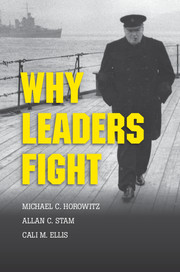Book contents
- Frontmatter
- Contents
- List of Figures
- List of Photographs
- List of Tables
- Preface
- Introduction
- 1 How Leaders Matter
- 2 Systematically Evaluating Leader Risk
- 3 Leader Risk across Geography and Time
- 4 The Experiences That Matter I: Military/Rebel Status, Age, and Education
- 5 The Experiences That Matter II: Childhood, Family, and Gender
- 6 “L’état, c'est moi” – or Is It?
- Bibliography
- Index
2 - Systematically Evaluating Leader Risk
Published online by Cambridge University Press: 05 October 2015
- Frontmatter
- Contents
- List of Figures
- List of Photographs
- List of Tables
- Preface
- Introduction
- 1 How Leaders Matter
- 2 Systematically Evaluating Leader Risk
- 3 Leader Risk across Geography and Time
- 4 The Experiences That Matter I: Military/Rebel Status, Age, and Education
- 5 The Experiences That Matter II: Childhood, Family, and Gender
- 6 “L’état, c'est moi” – or Is It?
- Bibliography
- Index
Summary
By the time of his election to the presidency of Croatia at age sixty-nine, Franjo Tudjman had already lived a long, dramatic, and tragic life. Born at the end of World War I, he was a young man living dangerously as one of Tito's partisans in World War II. He was an ardent believer in Tito's vision for Yugoslavia, rising quickly through the military ranks. Tudjman spent his forties and fifties learning and writing prolifically about Croatian history, frequently clashing with the Communist government as his nationalist beliefs solidified. Sent to prison at age fifty, Tudjman was released by the authorities after he served ten months of a two year sentence. His incarceration proved to be an opportunity. As one writer notes: “Tudjman exploited his prison time, casting himself as a martyr for the Croatian cause, and wrote extensively on his experiences and his vision for Croatia.” By his early sixties, Tudjman had been in and out of prison for his extreme nationalist advocacy, finally being released for good at age sixty-two for health reasons.
Tudjman's health concerns did not stop him from finalizing and carrying out his nationalist plan. In 1987, when he was sixty-five, Tudjman began traveling around Canada and the United States to solicit support from Croatian diaspora communities. By the time he became president of Croatia in 1991, he had a very specific nationalist legacy that he wanted to create. His vision for the country was so exclusivist that in his mind it necessitated a war to ethnically cleanse the nation. As a leader with the mentality of a true believer Tudjman took a paternalistic role toward the citizens of Croatia. Tudjman's life experiences combined to drive his self-efficacy about his martial decisions. “Yet if Tudjman saw himself as the hard-headed father of the contemporary Croatian state, he was also the idealistic, and disappointed, child of the former Yugoslav state.” Tudjman's life spanned much of the scope of modern Yugoslavia. “Born four years after the creation of the Kingdom of the Serbs, Croats, and Slovenes, he died eight years after Yugoslavia's dissolution. He embodied the ideals and faults of many members of the first generation: the ideologies of Croatia's ruling elite and its dissident intelligentsia.”
- Type
- Chapter
- Information
- Why Leaders Fight , pp. 58 - 92Publisher: Cambridge University PressPrint publication year: 2015



